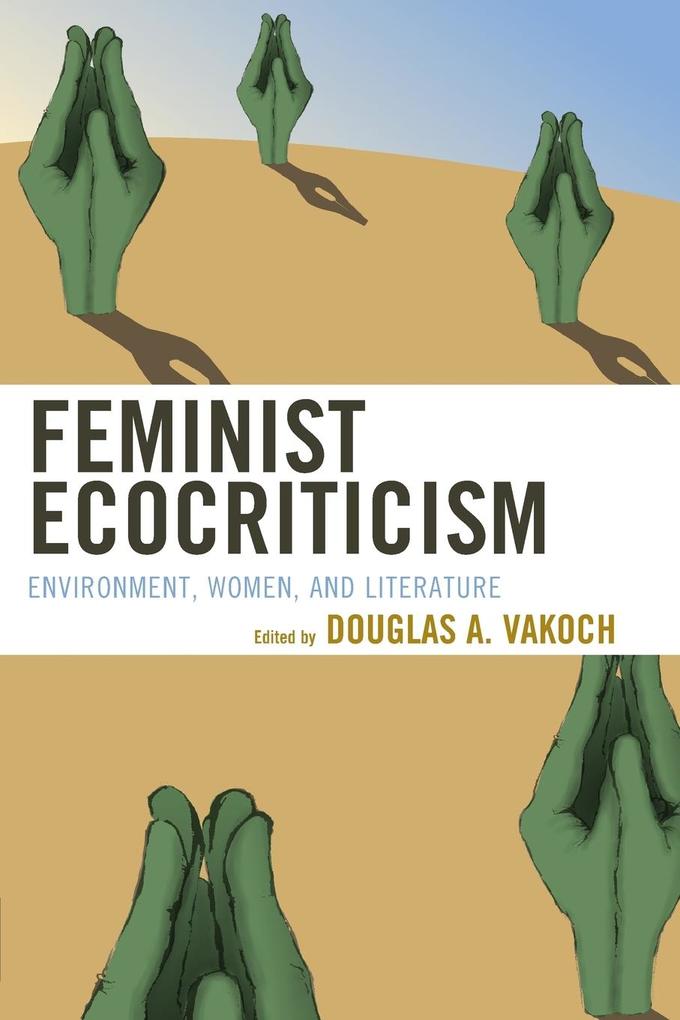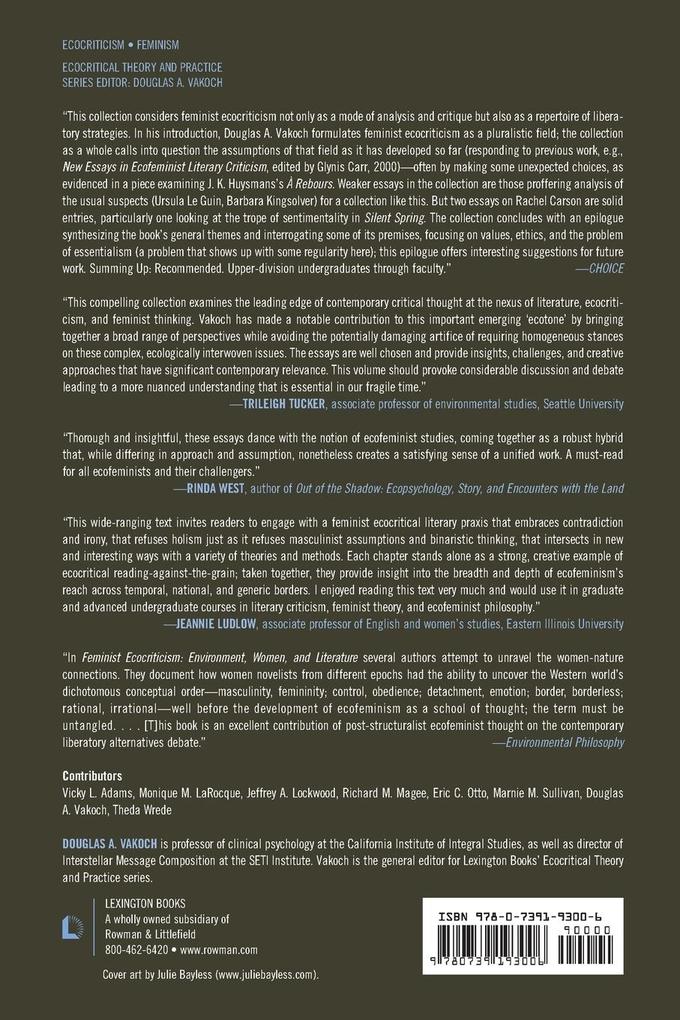
Zustellung: Mo, 05.05. - Do, 08.05.
Versand in 6 Tagen
VersandkostenfreiBestellen & in Filiale abholen:
Feminist Ecocriticism examines the interplay of women and nature as seen through literary theory and criticism, drawing on insights from such diverse fields as chaos theory and psychoanalysis, while examining genres ranging from nineteenth-century sentimental literature to contemporary science fiction. The book explores the central claim of ecofeminism-that there is a connection between environmental degradation and the subordination of women-with the goal of identifying and fostering liberatory alternatives. Feminist Ecocriticism analyzes the work of such diverse women writers as Rachel Carson, Barbara Kingsolver, Ursula K. Le Guin, and Mary Shelley. By including chapters from a comparable number of women and men, this book dispels the notion that ecofeminism is relevant to and used by only female scholars.
After uncovering the oppressive dichotomies of male/female and nature/culture that underlie contemporary environmental problems, Feminist Ecocriticism focuses specifically on emancipatory strategies employed by ecofeminist literary critics as antidotes, asking what our lives might be like as those strategies become increasingly successful in overcoming oppression. Thus, ecofeminism is not limited to the critique of literature, but also helps identify and articulate liberatory ideals that can be actualized in the real world, in the process transforming everyday life. Providing an alternative to rugged individualism, for example, ecofeminist literature promotes a more fulfilling sense of interrelationship with both community and the land. In the process of exploring literature from ecofeminist perspectives, the book reveals strategies of emancipation that have already begun to give rise to more hopeful ecological narratives.
Feminist Ecocriticism provides a novel integration of two important strands of contemporary literary criticism that have often failed to make contact: feminist criticism and ecocriticism. The openness of both feminist criticism and ecocriticism to multiple, even incompatible perspectives, without the insistence on unitary definitions of their fields, has given rise to a new hybrid discipline: feminist ecocriticism.
After uncovering the oppressive dichotomies of male/female and nature/culture that underlie contemporary environmental problems, Feminist Ecocriticism focuses specifically on emancipatory strategies employed by ecofeminist literary critics as antidotes, asking what our lives might be like as those strategies become increasingly successful in overcoming oppression. Thus, ecofeminism is not limited to the critique of literature, but also helps identify and articulate liberatory ideals that can be actualized in the real world, in the process transforming everyday life. Providing an alternative to rugged individualism, for example, ecofeminist literature promotes a more fulfilling sense of interrelationship with both community and the land. In the process of exploring literature from ecofeminist perspectives, the book reveals strategies of emancipation that have already begun to give rise to more hopeful ecological narratives.
Feminist Ecocriticism provides a novel integration of two important strands of contemporary literary criticism that have often failed to make contact: feminist criticism and ecocriticism. The openness of both feminist criticism and ecocriticism to multiple, even incompatible perspectives, without the insistence on unitary definitions of their fields, has given rise to a new hybrid discipline: feminist ecocriticism.
Inhaltsverzeichnis
Introduction. A Different Story
Douglas A. Vakoch
Chapter 1. Ecofeminist Theories of Liberation in the Science Fiction of Sally Miller Gearhart, Ursula K. Le Guin, and Joan Slonczewski
Eric C. Otto
Chapter 2. Barbara Kingsolver's Animal Dreams: Ecofeminist Subversion of Western Myth
Theda Wrede
Chapter 3. Reintegrating Human and Nature: Modern Sentimental Ecology in Rachel Carson and Barbara Kingsolver
Richard M. Magee
Chapter 4. Shifting Subjects and Marginal Worlds: Revealing the Radical in Rachel Carson's Three Sea Books
Marnie M. Sullivan
Chapter 5. Decadent Desire: The Dream of Disembodiment in J. K. Huysmans' A Rebours
Monique M. LaRocque
Chapter 6. "Discourse Excellent Music": Romantic Rhetoric and Ecofeminism in Mary Shelley's The Last Man
Vicky L. Adams
Afterword. Ecofeminism: The Ironic Philosophy
Jeffrey A. Lockwood
Douglas A. Vakoch
Chapter 1. Ecofeminist Theories of Liberation in the Science Fiction of Sally Miller Gearhart, Ursula K. Le Guin, and Joan Slonczewski
Eric C. Otto
Chapter 2. Barbara Kingsolver's Animal Dreams: Ecofeminist Subversion of Western Myth
Theda Wrede
Chapter 3. Reintegrating Human and Nature: Modern Sentimental Ecology in Rachel Carson and Barbara Kingsolver
Richard M. Magee
Chapter 4. Shifting Subjects and Marginal Worlds: Revealing the Radical in Rachel Carson's Three Sea Books
Marnie M. Sullivan
Chapter 5. Decadent Desire: The Dream of Disembodiment in J. K. Huysmans' A Rebours
Monique M. LaRocque
Chapter 6. "Discourse Excellent Music": Romantic Rhetoric and Ecofeminism in Mary Shelley's The Last Man
Vicky L. Adams
Afterword. Ecofeminism: The Ironic Philosophy
Jeffrey A. Lockwood
Mehr aus dieser Reihe
Produktdetails
Erscheinungsdatum
23. April 2014
Sprache
englisch
Seitenanzahl
168
Reihe
Ecocritical Theory and Practice
Herausgegeben von
Douglas A. Vakoch
Verlag/Hersteller
Produktart
kartoniert
Gewicht
266 g
Größe (L/B/H)
234/156/9 mm
ISBN
9780739193006
Entdecken Sie mehr
Bewertungen
0 Bewertungen
Es wurden noch keine Bewertungen abgegeben. Schreiben Sie die erste Bewertung zu "Feminist Ecocriticism" und helfen Sie damit anderen bei der Kaufentscheidung.


































